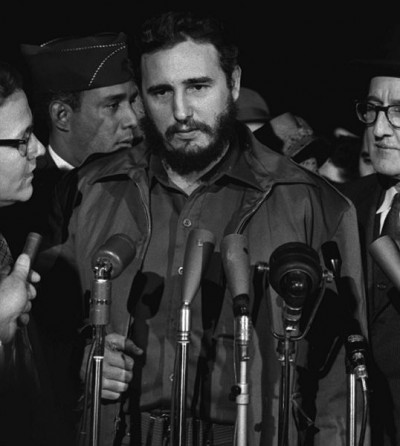On the Need for Censorship
by Orlando Luis Pardo Lazo / February 3, 2014 / No comments
Remove the secrecy and make censorship public in Cuba.

Fidel Castro arrives MATS Terminal, Washington, D.C. 1959. Photo: Wikimedia Commons.
Contrary to what you might think, people in Cuba actually miss having censorship. This attitude isn’t one of irony, but rather a strategy for freedom.

- Is it worth-while to focus on the last images and letters coming from the inside of the last living utopia on Earth? Is Cuba by now a contemporary country or just another old-fashioned delusion in the middle of Nowhere-America? A Cold-War Northtalgia maybe? Can we expect a young Rewwwolution.cu within that Ancien Régime still known as The Revolution? I would like to provoke more questions than answers.

- Orlando Luis Pardo Lazo was born in Havana City and still resides and resists there, working as a free-lance writer, photographer and blogger. He is the author of Boring Home (2009) and is the editor of the independent opinion and literary e-zine Voces.
We live in a country held hostage by despotism and the single-party government in power—the Communist Party. We live in a country where, since the very beginning of the Revolution, the press has been the private property of the military elite. For the average citizen, there’s not much that can be done against such a backdrop, but an initial step that would surprise even the authorities would be to demand public censorship in Cuba in order to make it visible in the midst of our society’s secrecy. The second step would be to instate a public official in the position of Official Censor.
My experience of being a censored writer in Cuba is phantasmagoric; censorship leaves no footprint and the next generation won’t believe my experiences. No editor has ever directly told me to censor any of my lines, nor given me any explanation or written record of why I was expelled from the Cuban literary field. No one signed an order for my books to be removed from publishers’ catalogues. In reality, I was condemned to be an autistic rather than an artistic writer. That’s why we should call for the restoration of Castroist censorship, at least while we’re not yet able to completely dismantle the island’s lingering system of repression.
Let me be clear: The island doesn’t have a specific Department of Censorship. The state press—the only legal press—has never published any serious criticism of the Revolution, and there’s no one else we can complain to about this intellectual silencing, either. There aren’t even any bureaucratic regulations in place to define what can and cannot be published. It’s precisely this fogginess that allows for maximum impunity, since everyone begins to censor everyone else, starting with the self-censorship that every author personally humiliates himself with in order to avoid institutional humiliation.
For there to be freedom of expression under totalitarianism, perhaps we have to start by introducing democracy’s mechanisms of censorship. Thereafter, we would have to fight for the right to minimize the spaces occupied by censorship, which currently encroach upon Cuba’s whole atmosphere, preventing us from breathing.




